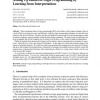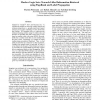63 search results - page 5 / 13 » Logical settings for concept learning from incomplete exampl... |
CORR
2000
Springer
13 years 7 months ago
2000
Springer
When comparing inductive logic programming (ILP) and attribute-value learning techniques, there is a trade-off between expressive power and efficiency. Inductive logic programming ...
AAAI
2011
12 years 7 months ago
2011
Inspired by “GoogleTM Sets” and Bayesian sets, we consider the problem of retrieving complex objects and relations among them, i.e., ground atoms from a logical concept, given...
LATA
2009
Springer
14 years 2 months ago
2009
Springer
This tutorial will present an overview of the use of Monadic Second-Order Logic to describe sets of finite graphs and graph transformations, in relation with the notions of tree-w...
KDD
2008
ACM
14 years 8 months ago
2008
ACM
The input to an algorithm that learns a binary classifier normally consists of two sets of examples, where one set consists of positive examples of the concept to be learned, and ...
SGAI
2007
Springer
14 years 1 months ago
2007
Springer
In this paper we describe a novel technique which implements a spatiotemporal model as a set of sub-models based on first order logic. These sub-models model different, typicall...



